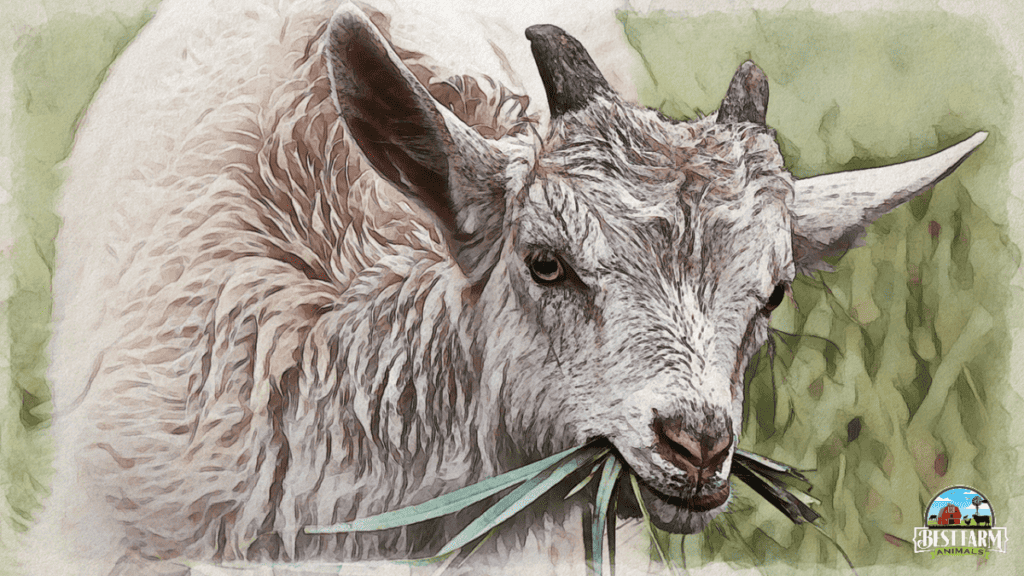Goats are hardy animals, but they’re still susceptible to health complications. This is especially true when they are exposed to extreme weather conditions. A goat that’s left out in heavy rain is as liable to get a cough and a runny nose as a human.
- Common Causes of a Runny Nose in Goats and How To Treat Them
- #1 Dusty Feed Can Give a Goat a Snotty Nose
- #2 Excessive Ammonia Can Cause Nasal Discharge In A Goats Nose
- #3 Shipping Fever Causes Stress-related Snotty Goat Noses
- #4 Common Colds Cause Clear To White Discharge
- #6 How To Diagnose Pneumonia In Goats
- #7 Lungworms Can Cause Coughs and Snotty Noses
- #8 Symptoms of Pasteurellosis Include Nasal Pus
- #9 Enzootic Nasal Adenocarcinoma Effects the Mucosal Nasal Glands
- 10. Mycoplasma Causes Goats to Cough and Have Runny Noses
- 11. Flu Makes Your Goat Sneeze
- Medicine For A Goat With A Runny Nose
- FAQs About Goat’s Runny Nose
- Can I give over-the-counter cold medicine to my goat?
- Conclusion
Why do goats get a runny nose? Dust, stress, and respiratory diseases cause goats to get a runny nose. Allergies, viruses, and even excessive heat can also cause snotty noses.
If you notice any of your goats with boogers, treat them immediately. A quick response will help prevent a minor health condition from escalating into something more dangerous.
Although many goats with boogers or a nasal discharge do not require treatment, your veterinarian will probably recommend a course of antibiotics if they do.

Common Causes of a Runny Nose in Goats and How To Treat Them
#1 Dusty Feed Can Give a Goat a Snotty Nose
Dirty, dusty enclosures can result in a runny nose goat and will produce more nasal discharge than usual. Our goats often get runny eyes and noses on hot, windy days. Thus, excessive dust or smoke in the air can cause a runny nose in goats.
Similarly, if goats eat dusty hay, they start sneezing, and their noses run. These aren’t severe problems but can escalate if not treated.
Support the goat’s immune system by offering vegetables high in vitamin A. Supplement your goat’s usual rations with probiotics such as raw apple cider vinegar or water kefir. These treatments will help your goat’s nose dry up faster and prevent the condition from worsening.
- Excessive dust or smoke in the air can cause a runny nose

#2 Excessive Ammonia Can Cause Nasal Discharge In A Goats Nose
A buildup of excessive ammonia in your goat enclosure irritates your goat’s lungs and damages their respiratory systems. Ammonia smells terrible for a reason and constantly inhaling it predisposes your goat to various viral and bacterial infections. This can cause pneumonia if left untreated.
An ammonia buildup can cause a runny nose and pneumonia. The best way to deal with this problem is to clean your goat enclosure thoroughly.
Remove any old, wet bedding and replace it with fresh wood chips or straw. Ensure your goat shelter has adequate cross-ventilation. These hygiene practices will prevent ammonia buildup and ensure your goats have clean, healthy air to breathe.
- An ammonia buildup can cause a runny nose and pneumonia
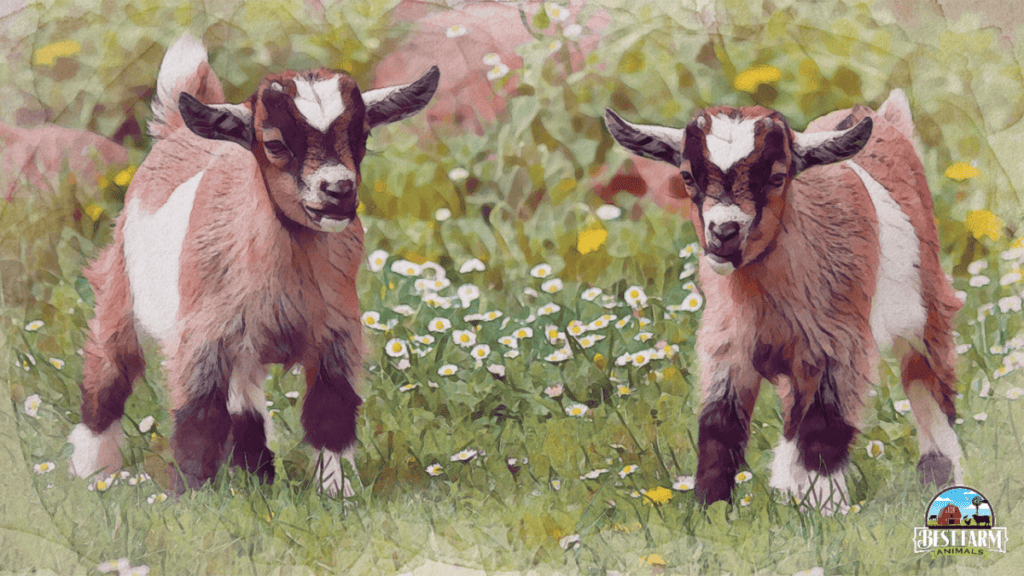
#3 Shipping Fever Causes Stress-related Snotty Goat Noses
Mucopurulent discharge from the eyes and nose, accompanied by hurried breathing, are the first signs of shipping fever or Mannheimia pneumonia.
Mannheimia pneumonia also causes anorexia, and abortion in pregnant does and is often fatal.
High stress can cause goats to get sick and have nasal discharge.
Shipping fever most often occurs in goats that have undergone stress, either from transportation, change of diet, weaning, or associating with animals from another farm.
Veterinarians will usually recommend a course of long-acting antibiotics, such as florfenicol or tyrosine. A veterinarian may prescribe anti-inflammatories in acute cases in conjunction with antibiotics.
- High stress can cause goats to get sick and have a nasal discharge
#4 Common Colds Cause Clear To White Discharge
A goat with crusty eyes and a mucus nose are the earliest signs of a goat having a cold. Goats can get colds as quickly as humans can.
Like humans, they’ll get a runny nose and cough but usually display no signs of a fever. Clear discharge usually means cold.
A cold isn’t life-threatening but, as goats are very susceptible to pneumonia, you should keep a close eye on any goat that has a runny nose, clear or cloudy mucus, watery eyes, and a lazy attitude to the day.
Antibiotics won’t work against a common goat cold any more than it would a human one. The best way to treat a goat with a cold is to boost its immune system.
Echinacea and garlic are two natural substances that accelerate your goat’s recovery. Foods rich in vitamin A, like carrots and sweet potatoes, will also help, along with probiotics like yogurt.
Ensure your goat is drinking well and encourage it to consume more fluids by mixing up lemon juice, warm water, and honey.
- Clear discharge usually means a cold
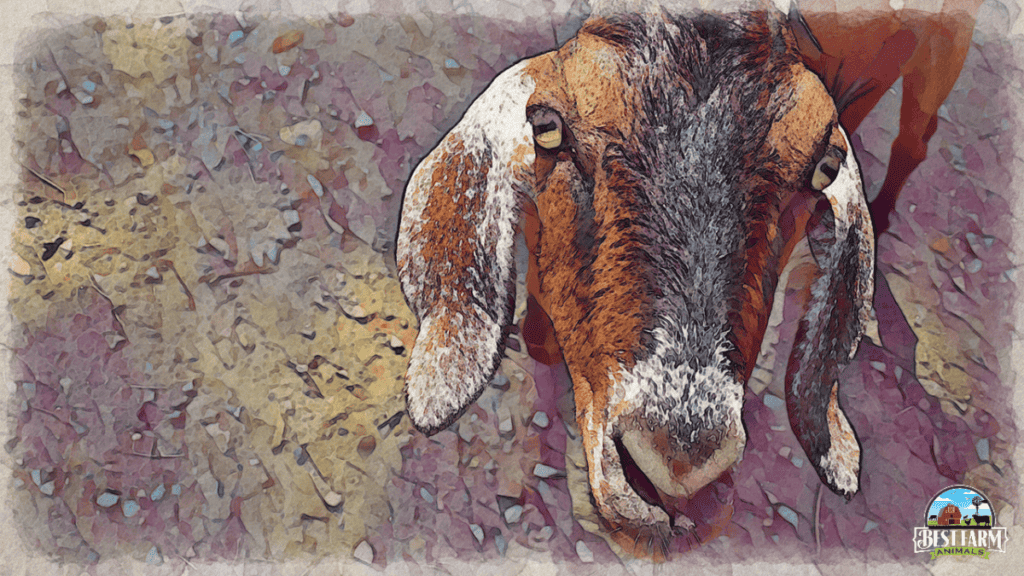
#5 Symptoms of a Nasal Worm or Nasal Bot Infestation In Your Goats
Nasal bots or nasal worms infestation can result in goats having boogers or snotty noses. In addition to bloody nasal discharge, a goat with a nasal worm infestation will show the following symptoms:
- Difficulty breathing
- Stamping feet
- Snorting
- Coughing
- Sneezing
It’s easy to confuse a nasal worm infestation with pneumonia, although only the latter causes a high temperature.
Affected goats also show an impaired ability to smell, making it difficult for infected kids to smell and bond with their offspring.
There are various treatment options for sheep with nasal worms, but only one for goats. Abamectin is a widely used insecticide and anthelmintic effective against goats’ nasal worms.
- Nose worms can cause a snotty nose
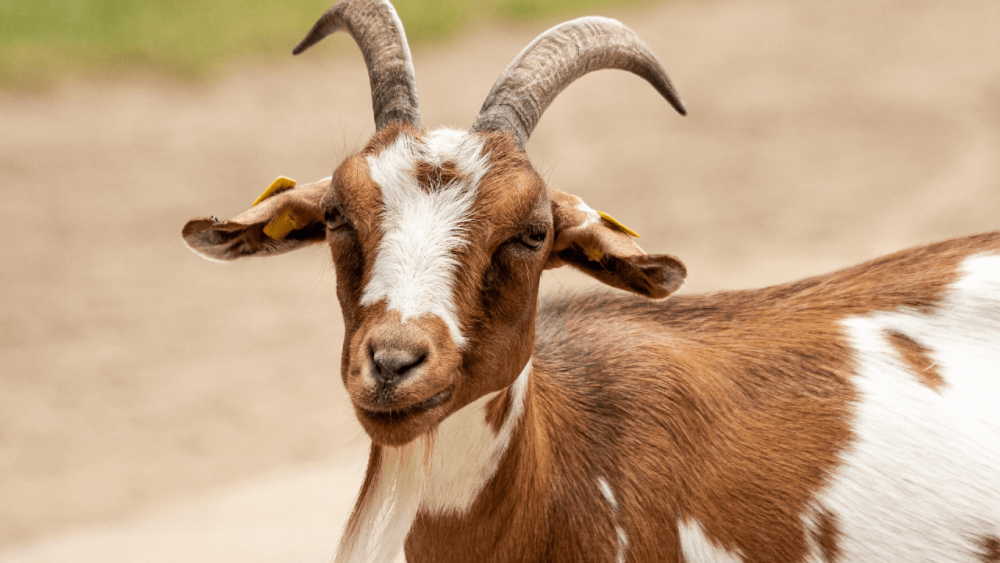
#6 How To Diagnose Pneumonia In Goats
Pneumonia’s early signs in goats are runny nose and eyes. Unfortunately, Our 15-year-old goat died a couple of weeks ago from pneumonia. We could do very little at her advanced age to cure it. Dolly first presented with symptoms a month ago.
The common indications of pneumonia and a runny nose include coughing and a snotty nose with whitish nasal discharge. Occasionally, goats may also experience diarrhea.
As Dolly’s condition worsened, we could hear the unsettling “death rattle” in her lungs. She developed a cough and lost interest in food.
Fortunately, Dolly had a non-contagious variety of pneumonia, but we vaccinated the rest of the herd to be on the safe side.
We treated Dolly with broad-spectrum antibiotics and then repeated the treatment as advised by our veterinarian. Unfortunately, the pneumonia didn’t respond to the treatment, and we had to euthanize our old girl.
It isn’t easy to treat or prevent pneumonia, as there are so many different types and causes. A regular vaccination program can help reduce the risk and proper herd management. This includes providing a clean, dry enclosure with good ventilation and plenty of room for the whole herd.
- Pneumonia is usually accompanied by coughing and a runny nose
#7 Lungworms Can Cause Coughs and Snotty Noses
Lungworms and other parasitic nematodes affect the goat’s lower respiratory tract causing shallow breathing, coughing, sneezing, and nasal discharge in goats. A lungworm infection can cause a goat to lose weight and reduce milk production.
A vet treats lungworm with:
- Broad-spectrum anthelmintics
- Antimicrobials to prevent secondary bacterial infections
- Anti-inflammatory drugs as required
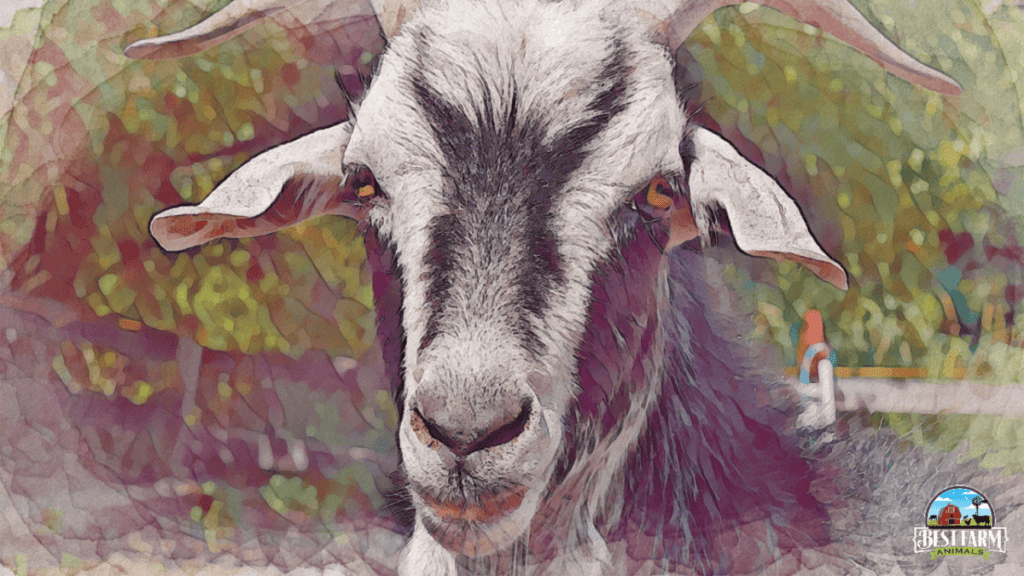
#8 Symptoms of Pasteurellosis Include Nasal Pus
Pneumonic pasteurellosis causes goats to have hypersalivation, fever, rapid breathing, and nasal discharge that resembles pus or mucus.
Stress factors like extreme weather conditions, transportation, dipping, and deworming can cause goats to become more susceptible to respiratory infections.
Pasteurellosis progresses rapidly, making treatment challenging. If caught earlier enough, pasteurellosis responds well to a course of fluoroquinolone antibiotics. It has proved resistant to penicillins, however.
It’s easier to prevent pasteurellosis than it is to cure it. A good vaccination and management regime can protect your goats against this disease. A clean enclosure and adequate protection against extreme weather conditions can help reduce the risk of infection.
- Clean, dry protection from the weather helps keep goats healthy
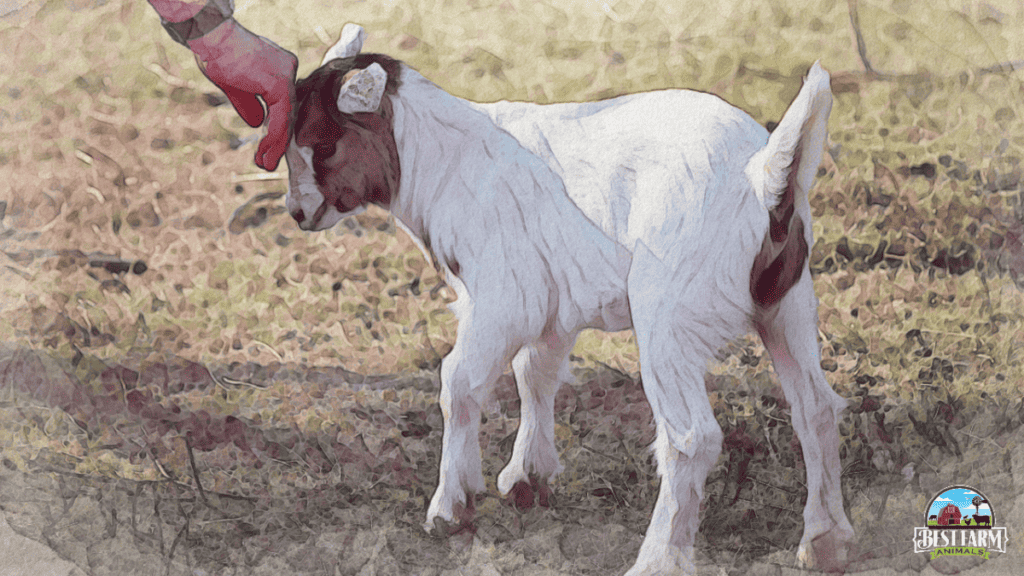
#9 Enzootic Nasal Adenocarcinoma Effects the Mucosal Nasal Glands
Enzootic nasal adenocarcinoma most commonly occurs in young goats and kids. It is a contagious tumor of the nasal mucosal glands that causes respiratory distress, copious nasal discharge, and skull deformations.
Highly contagious, enzootic nasal tumors cause progressive respiratory illness and overproduction of fluid in the lungs. This fluid may flow freely from the goat’s nostrils when it lowers its head.
Symptoms only show months after the initial infection, and there is no treatment. You will need to destroy or euthanize any affected animals humanely.
- Enzootic Nasal Adenocarcinoma is uncureable
10. Mycoplasma Causes Goats to Cough and Have Runny Noses
A goat that has a runny nose and cough are two of the earliest symptoms of mycoplasma. It may also result in Contagious Caprine Pleuropneumonia, which is highly fatal.
Accurate diagnosis, quarantine, and strict biosecurity protocols are necessary to prevent transmission to healthy goats.
Vaccines are available to prevent the disease, and treatment is done using tetracyclines, macrolides, fluoroquinolones, and florfenicol.
11. Flu Makes Your Goat Sneeze
Your goat will sneeze and have a runny nose when it has flu. This develops when a virus or bacteria affects the upper respiratory tract of goats. The condition is particularly dangerous for a goat kid, who has an underdeveloped immune system and can kill them within hours. The condition may also develop into pneumonia if not treated.
Your goat will sneeze and have a runny nose when it has flu. This develops when a virus or bacteria affects the upper respiratory tract of goats. The condition is particularly dangerous for a goat kid, who has an underdeveloped immune system and can kill them within hours. The condition may also develop into pneumonia if not treated.
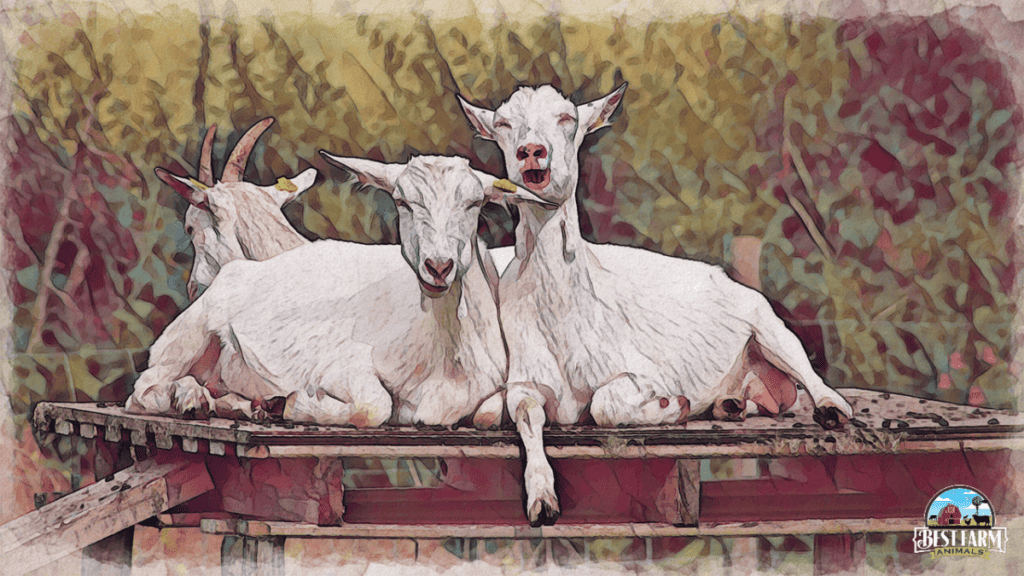
Medicine For A Goat With A Runny Nose
Three types of medicines can be given to a goat with a snotty nose.
- Antihistamines: These are used to treat allergic reactions and can help with a runny nose caused by allergies.
- Decongestants: These can help if the goat is having trouble breathing due to a blocked nose.
- Antibiotics: If the runny nose is due to a bacterial infection, antibiotics may be prescribed by a vet.
Administering Antihistamines To Goats
Antihistamines in goats are not as common as in humans or other pets like dogs and cats, so there’s less concrete information available. However, Diphenhydramine, commonly known as Benadryl, has been used in goats. The dosage is typically 1 milligram per pound of body weight, given orally every 8 to 12 hours, but this can vary depending on the severity of the symptoms and the individual goat’s health status.
It’s very important to consult with a veterinarian before administering any medication to a goat. Overdosing can be harmful or fatal, and underdosing may not provide the desired effects.
Your vet can provide appropriate dosage advice based on the goat’s weight, age, overall health status, and the specific symptoms it’s experiencing.
Furthermore, a runny nose could be a symptom of a more serious underlying disease that requires different treatment. For example, if your goat has a bacterial infection, an antihistamine will not cure the infection and antibiotics may be necessary.
Therefore, it’s crucial to have a proper diagnosis to ensure the treatment addresses the symptoms’ root cause.
Goat Decongestants
Decongestants are used to relieve nasal congestion in goats. However, their use should always be under the guidance of a veterinarian. Improper dosing can lead to serious side effects.
One of the most common decongestants used in veterinary medicine is Pseudoephedrine. But, its use in goats is not well-documented and can have serious side effects if not used properly. Furthermore, it’s a controlled substance in many places due to its potential use in manufacturing illicit drugs, so its availability may be restricted.
In many cases, a better approach to managing a goat with a runny nose and congestion may be to manage the underlying cause of the symptoms.
For example, if a respiratory infection is causing the symptoms, antibiotics may be more effective than a decongestant. Similarly, if an allergen is causing the symptoms, removing the allergen or using antihistamines may be more effective.
Antibiotics For Goats
Several types of antibiotics are used to treat bacterial infections in goats. The choice of antibiotic depends on the specific type of infection, the overall health of the goat, and local regulations regarding antibiotic use in livestock. Here are a few common ones:
- Penicillin: This is a broad-spectrum antibiotic that is commonly used in goats. It’s effective against a variety of bacteria.
- Tetracycline: This is another broad-spectrum antibiotic that can be used in goats. It’s often used to treat respiratory and digestive tract infections.
- Sulfonamides are often used to treat goats’ bacterial diarrhea (scours).
- Enrofloxacin (Baytril): This fluoroquinolone antibiotic is often used for respiratory infections. It’s important to note that in many places, including the U.S., it’s not approved for use in food-producing animals, including goats, due to concerns about antibiotic resistance.
- Oxytetracycline: This is often used to treat various infections, including respiratory infections and foot rot in goats.
Remember that the use of antibiotics should always be under the supervision of a veterinarian, and they should only be used when necessary to treat bacterial infections.
Overuse or misuse of antibiotics can lead to antibiotic resistance, which is a serious public health issue. Your vet can provide guidance on the appropriate antibiotic and dosage for your goat’s specific situation.
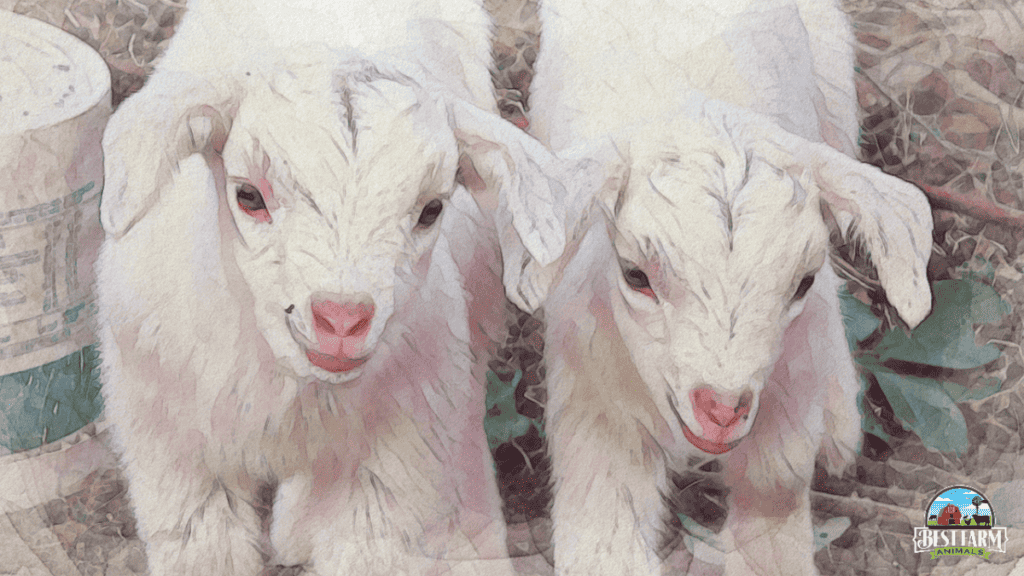
FAQs About Goat’s Runny Nose
There are many reasons why your goat will have a runny nose. We have described 11 possible causes and treatments. Here are other commonly asked questions on why your goat has a runny nose.
Is it normal for a goat’s nose to be wet?
Goats’ noses should be wet and soft. The wetness helps cool off the goat and trap any particles so they don’t get into their respiratory system. Wetness also keeps the nose from drying and cracking. It is not normal for a goat to have a runny nose; this could indicate an infection or contamination with a chemical or dust.
Can I treat my goat’s runny nose at home?
While some mild cases of runny nose in goats may resolve on their own, it’s recommended to seek veterinary advice. A veterinarian can diagnose the underlying cause and provide appropriate treatment to prevent any potential complications.
Can I give over-the-counter cold medicine to my goat?
No, it is not advisable to give over-the-counter cold medicine or any medication meant for humans to goats without veterinary guidance. Goats have different physiology and metabolize drugs differently. Always consult a veterinarian for proper diagnosis and medication recommendations.
How is a runny nose in goats treated?
The treatment for a runny nose in goats depends on the underlying cause. It may involve administering antibiotics for bacterial infections, antihistamines for allergies, decongestants for nasal congestion, or specific medications for parasite-related issues. A veterinarian will recommend the most appropriate treatment based on the diagnosis.
How can I prevent runny noses in my goat herd?
Maintaining good herd management practices is crucial. This includes providing clean and well-ventilated living spaces, avoiding overcrowding, practicing regular vaccination programs, and implementing proper biosecurity measures. Additionally, maintaining a balanced diet and minimizing exposure to potential irritants can help support a healthy respiratory system in goats.
When should I consult a veterinarian?
If your goat’s runny nose persists, worsens, or is accompanied by other concerning symptoms such as coughing, lethargy, or loss of appetite, it is recommended to consult a veterinarian promptly. They can evaluate the condition, provide a proper diagnosis, and recommend appropriate treatment options.

My Essential Goat Supplies
This list contains affiliate products. Affiliate products do not cost more but helps to support BestFarmAnimals and our goal to provide farm animal owners with accurate and helpful information.
This little giant bucket fits on a fence and this one’s easy to carry.
A sturdy dog collar is essential. Don’t do rope (they’ll break and tangle) or chain (injury!).
A Black Water Tub is way nicer than buckets that tip over. I like to get a 20 or 30-gallon in each pen so my goats have plenty of water, but you can get 100-gallons if you have a lot of sheep in one pen.
Loose minerals in a small bag or a Purina 50 lb bag, and a mineral feeder for free-choice is the best option. One side holds minerals, and the other holds baking soda. Don’t feed sheep goat minerals because it usually contains copper- something that is fatal to sheep.
Hoof trimmers are a necessity because you’ll need to trim your sheep’s hooves every few months. These are nice for the price.
Don’t make the mistake I made by waiting to order a drench gun before you need it. I was surprised by how often I use it. It helps with bloating, dehydration, and other ailments. Here’s a good drench, but you can also drench a bloat solution or water if dehydrated.
Digital Thermometor for when your lambs act sick. You’ll need to know if their temps are too low or too high so you can accurately diagnose the issues.
Vetericyn for wound care. It makes a big difference in a speedy recovery.
Check out this list of goat milk supplies you need if you have milk goats.
Conclusion
A goat with a runny nose isn’t necessarily at death’s door. Dust, common colds, and other relatively benign problems can cause a snotty nose, none of which are life-threatening. However, nasal discharge is a symptom of some illnesses, which can escalate quickly.
Treat the problem early by giving your goats probiotics and fresh foods high in vitamin A, and you could save a life or two. Preventing respiratory conditions is more straightforward than treating them. Raising goats can be challenging when they are sick, but it’s very rewarding as you are able to help them get better!

